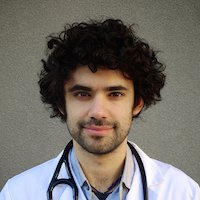As you can see from our How I Work Smarter (HIWS) mapping post, Lexington Kentucky is emerging as a powerhouse of EM leaders and social media gurus. After WildcatEM HIWS contributions from Matt Dawson, Rob Rogers, and Chris Doty, we have Dr. Sam Ghali (@EM_ResUS) taking a swing. Dr. Ghali is an up and coming member of the SoMe circuit with a focus on point-of-care ultrasound, resuscitation, and critical care. Nominated by Haney Mallemat, Dr. Ghali generously shares his thoughts about career and life management.
-
Name: Sam Ghali, MD

- Location: Lexington, KY
- Current job: Emergency medicine faculty at the University of Kentucky Medical Center
- One word that best describes how you work: Instinctively. I’m a very instinctive person, consistently going with my gut. Work is no exception.
- Current mobile device: iPhone5
- Current computer: 15”-Macbook Pro, 13”-Macbook Air, Dell (Office Desktop), Dell (Extraneous PC)
What’s your office workspace setup like?

What’s your best time-saving tip in the office or home?
If you listen to podcasts (or any educational audio) at normal playback speed, the following tip will transform your efficiency: Increase the playback speed! Make sure you have an audio player that allows this option (most do, but some don’t). This speed is almost universally expressed as a multiple of regular speed (1X). At first this may overwhelm you, but I promise your brain will quickly adapt. The amount of information per time your brain can digest far exceeds that provided by average human talking speed. Start at 1.2X or 1.3X and work your way up. The optimal speed will certainly depend on the speaker you’re listening to {for ex: I like Michelle Lin at around 2.4X :-) }, but in general I usually find myself listening at about 2X to 2.5X speed. Obviously this technique gets you through the material in unbelievably less time, but importantly it also allows me to focus far better, as my mind tends to drift at slower speeds!
Disclaimer: After engaging in this for several consecutive hours, you may temporarily find it somewhat frustrating talking with people since it takes everyone “forever” to say what they’re trying to say.
Close 2nd: If you’re really trying to get stuff done– turn your Twitter notifications OFF!
What’s your best time-saving tip regarding email management?
If using Gmail: Hit the # key (Shift + 3). (Make sure keyboard shortcuts are turned on under Settings) This is my favorite key. I use it quite liberally. ;-)
What’s your best time-saving tip in the ED?
I work in an academic setting and see the majority of my patients in conjunction with the residents. I like to see the patients before they do or at least before they “present” the patient to me. My philosophy is that residents are training to be attendings; and as attendings, they won’t be “presenting” patients. So why train for 3 (or 4) years to perfect this drill? After seeing the patient myself– and attaining that (unibased) instinctual, humanistic gestalt that can only be drawn from personal patient contact– I can now have a much more meaningful and productive conversation with resident as I ask them what they think, why they think it, and what they want to do. I find this strategy to be incredibly efficient and all the while allowing for optimal teaching/learning.
ED charting: Macros or no macros?
Since I’m seeing most patients with residents, my notes typically consist of a Dragon-dictated blurb of what I want on the chart. Macros are super efficient and I think’s they’re great as long as we’re aware of their pitfalls and their potential to lead to medicolegal crucifixion.
What’s the best advice you’ve ever received about work, life, or being efficient?
Family first, always. Control your career, never let your career control you. We have a tendency to get so caught up in work that we forget how precious and short life is. Don’t let this happen. Keep in mind life can be taken away from us or our loved ones at any moment. Remember, in the end– all we’re left with is memories.
Is there anything else you’d like to add that might be interesting to readers?
As emergency physicians– and as human beings– I think one of the greatest things we can do is to find ourselves, know ourselves, believe in ourselves; and never, ever lose sight of who we truly are.
- We should never underestimate the power of our minds; used properly we can accomplish most anything.
- We must realize that we determine our own futures
- As we go through our careers–and our lives–we must be confident, yet remain humble. On our journey we will cross the paths and touch the lives of many people along the way. Be kind to them.
- Never stop learning. Never stop teaching. Never stop loving.
Who would you love for us to track down to answer these same questions?
- Andrew Sloas (@PEMEDpodcast)
- Stephen Smith (@smithECGBlog)
- Jeffrey Kline (@klinelab)
I’d like to thank Haney Mallemat (@CriticalCareNow) for tagging me, as well as Michelle Lin (@M_Lin) & Ben Azan (@BenAzan) for having me on the series. Truly an honor!
Author information
The post I am Dr. Sam Ghali, EM Faculty and Ultrasound Expert at The University of Kentucky: How I Work Smarter appeared first on ALiEM.

